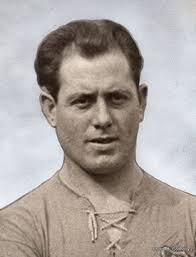THE JACK COCK STORY
By Vince Cooper
There was a time when one of the country’s leading centre-forwards was just as big a star treading the music hall boards and also turned his hand to the silver screen. The same man was awarded the Military Medal for ‘bravery in the field’ and was mentioned in dispatches for gallantry during the Great War whilst serving in the famous Footballers Battalion.
That man was Jack Cock who played for six league clubs, made two appearances for England, scoring twice (including a debut goal with his second touch in the first International after the war) and was one of the earliest big personalities in the game with a number of companies using his fame to advertise their products.
It sounds like a story they could have made into a film!
John Gilbert Cock was born in an unlikely football outpost, the village of Phillack close to St Ives Bay on Cornwall’s Atlantic Coast, in 1893. His dad, James, was an iron trimmer and when Jack was still a child the family moved to London, settling in Fulham.
After being fired from a job as a caddie at Burnham Beeches golf club for playing football with a golf ball on the green Jack decided to follow in his dad’s footsteps working as a moulder in an iron foundry whilst joining his first club, West Kensington United as a 15-year-old. He also played for local clubs Forest Gate and Old Kingstonians before being offered a trial by Brentford, then of the Southern League in 1914. He joined the Bees as an amateur and made three appearances, scoring once before receiving an offer to turn pro for 2nd Division Huddersfield Town and moving north.
Shortly after joining the Yorkshire club Cock’s career (along with that of all footballers) was brought to an abrupt halt by the outbreak of the Great War.

a Footballers Battalion team with Jack bottom centre
Quickly signing up and joining the 17th Service Battalion of the Duke of Cambridge’s Own (Middlesex) Regiment, the famed ‘Footballers Battalion’, Cock fought on the front line, earned that Military Medal for ‘bravery in the field’, was mentioned in dispatches and, at one time, was listed as ‘missing, presumed dead’. He reached the rank of Lance Sergeant and also found the time to play for Brentford in the London Combination when home on leave.
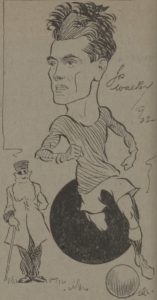
Once the war ended Cock returned to Yorkshire to resume his career with Huddersfield and his form was such that he was called into international action. In October 1919 England met Wales twice on successive Saturdays in unofficial ‘Victory International’ matches. For the second of these Cock was called up to replace the injured Joe Kitchen of Sheffield United and he had a hand in the first goal in a 2-0 victory, scored by Chelsea’s Bob Whittingham.
Cock’s performance there led to him being awarded his first cap for the following week’s home international match against Ireland in Belfast, the first official international since the spring of 1914 and he made a stunning start.
Cock kicked off and the ball was quickly fed to Bradford’s Bob Turnbull. The right-winger’s cross was met by the centre-forward whose shot evaded ‘keeper Bill O’Hagen and; ‘the ball was back on the whitewashed spot in the centre of the ground before the home team had kicked it’. Ireland would later equalise through Belfast Celtic’s Jimmy Ferris and the match finished all-square.

‘The hope of his side’
Within a week of his England debut Cock was on the move. Huddersfield were struggling financially at the time and an offer of £2,500 from Chelsea boss David Calderhead proved impossible to refuse. In the switch to West London he was moving close to brother Donald who, by this time was plying his trade at Fulham.
Donald would spend four years at Craven Cottage scoring 43 goals in 86 games before later playing for Notts County, Arsenal, Clapton Orient and Wolves.

‘A game cock and a little cockerel’
Jack quickly showed his mettle for his new club. After scoring twice in a 4-0 win over Bradford Park Avenue on his debut he got the Blue’s only goal in a 3-1 defeat at Preston in early November and followed this up with a hat-trick in a 4-0 win over the same team a week later (the other goal came from Danish amateur star Nils Middelboe).
He finished the season for the Blues with 21 league goals and three more in the FA Cup as Chelsea enjoyed their best campaign to date finishing third in the league and missing out on a cup final spot when losing to Aston Villa at the semi-final stage.
Having been left out of the England team that lost to Wales at Highbury in March 1920 Cock returned to the line-up for the match with Scotland at Hillsborough a month later.
Just as in his first game for England Cock was quick to find the back of the net, converting a cross from Aston Villa winger Charlie Wallace after just nine minutes. But that was just the start of the scoring. Scotland were 4-2 up by half-time but the English came back to win 5-4 in a match goalkeeper Sam Hardy later remembered as: “The most amazing international match in which I have ever played”. The surprise was that this proved to be the last of Cock’s international caps. After scoring in each of his first two matches for his country and being widely regarded as the best centre-forward in the land at the time he was overlooked by the selectors and would continue to be for the rest of his career.
That summer Cock added another string to his bow when appearing as himself in the silent film ‘The Winning Goal’ about fictional football team Blackton Rovers.
Cock’s rise to national prominence continued when he started writing a regular football column for The Globe newspaper. He had also been praised for his singing skills in the dressing room before matches and, it was claimed, had a fine tenor voice. This led him to work in local music halls such as the ‘Granville’ in Walham Green where a one-week engagement was extended to two such was his popularity and with his singing fame growing across the country he is said to have considered giving up football to ‘work the halls’ full time.
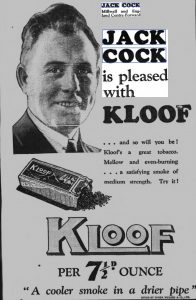
‘Jack Cock is pleased with Kloof’
He was also doing well off the the field with various advertising contracts including for ‘Phoeferene’ a tonic said to steady nerves and later ‘Kloof’ tobacco.
Chelsea tumbled down the table in the 1920-21 season dropping down to 18th place with Cock, who scored 15 times in all competitions, one of the few shining lights. Perhaps the low point of the club’s efforts came when they lost to Spurs 5-0 and 4-0 on successive weekends.
Showing the inconsistency they were famous for at the time, the Blues bounced back in the following campaign to finish 9th (just three points off 3rd) with the Cornishman top-scoring for the third year in a row, this time with 13 goals in 31 starts. But cracks started to appear in Cock’s relationship with the club and he was placed on the transfer list at his own request although he later agreed to stay.

Off to Everton
More problems surfaced between player and club at the start of the following campaign and after making just 11 starts for the Londoners and scoring once he was transferred to Everton for around £1,000. At Goodison he helped push the team up the table after they had made a poor start to the season.
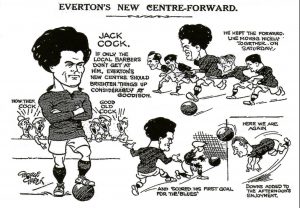
Whilst continuing his music hall career Cock made 69 appearances for Everton over a three-year span and also acted at mentor to a young Dixie Dean before moving on again in March 1925 this time to Plymouth Argyle in a joint deal with Fred Forbes also going to Devon at the same time.
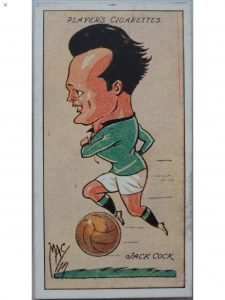
At Plymouth Cock continued to find the net at a good clip and he top-scored for two seasons before losing his form and being relegated to the reserves. He left Argyle having scored 72 goals in 90 games, returning to London in 1927 and signing for Millwall with the Lions breaking their transfer record to recruit him.
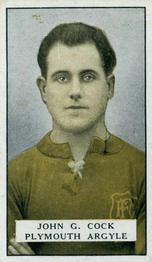
Cock’s debut for the Lions saw him score twice and have a hand in four more in a 9-1 thrashing of Coventry City and he quickly became a hero in the East End.
All through this time Jack continued with his singing career. One report of him appearing at the ‘Empress’ in Brixton states that; ‘the audience lustily joined in on the chorus of his signature song My Blue Heaven’.
During the 1928-29 season he reached 200 total league goals for his five clubs and he would score 77 times in 115 games for the Lions before moving on again, having finished top scorer three seasons in a row as the club won promotion to the second division and established themselves there.
Cock had been the ideal all-round centre-forward combining speed, the ability to shoot with either foot and heading prowess. In his newspaper columns he often bemoans the fact that the inside-forwards he played with ‘lacked sharpness’ meaning that he often had to create his own chances.
Cock was given a free transfer by Millwall in 1931 and stepped down to the Southern League, signing for Folkestone and finishing his league career with 234 goals in 391 matches.

Scenes from ‘The Great Game’
Whilst the footballing career was winding down Cock was still active ‘in the halls’ and he earned another chance to show off his acting abilities when being offered a leading role in ‘The Great Game’ a 1930 film. Mostly shot at Stamford Bridge, the movie is about a team’s run to the FA Cup final and also featured the first credited acting role of Rex Harrison. Having signed a recording contract with Parlophone Records he toured the country in support of the film, singing some of his favourite songs before it was shown.
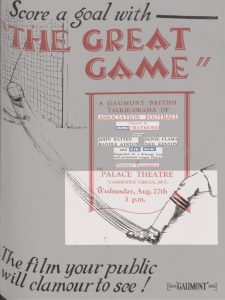
After his spell with Folkestone, Cock spent a short time with Walton & Hersham in the Surrey Senior League before hanging up his boots. He became an estate agent whilst continuing with his singing and acting careers until returning to football when taking over as Millwall manager in 1944 leading them to the 1944-45 War Cup final where they lost to another of his old clubs in Chelsea.
After four years managing the Lions he was fired in August 1948, along with the chairman and two other directors amid allegations of ‘extravagance in expenditure on alcoholic refreshment’ and he then took over as mine host at The White Hart pub in New Cross with wife Gertrude.
Jack Cock passed away in Kensington in 1966 aged 72.
International footballer, manager, journalist, movie star, music hall headliner, recording artist, estate agent and publican. It’s fair to say that Jack Cock led a full and varied life. Might he have become an even bigger name if he had focused on just football? It’s possible, but what a life!

